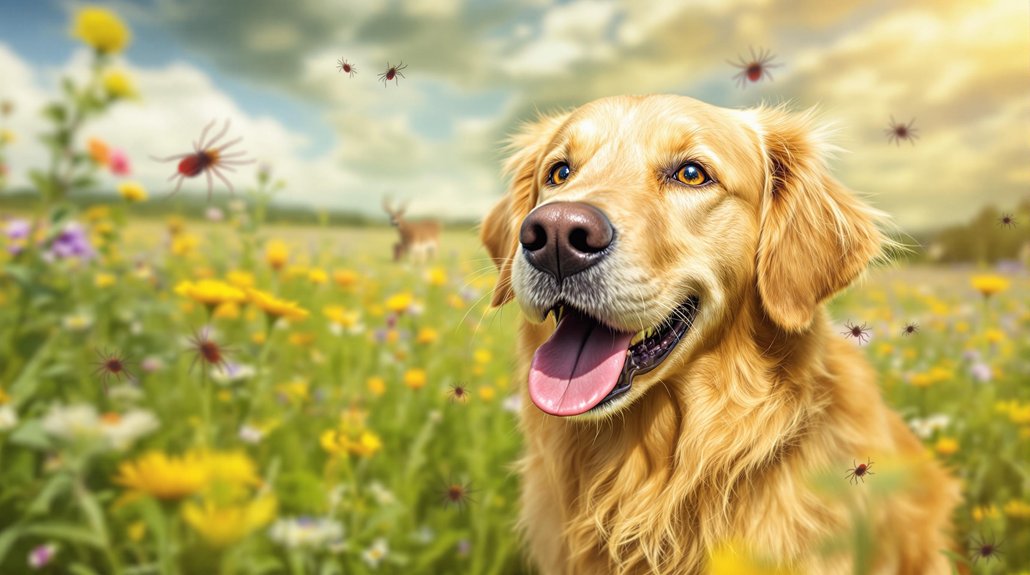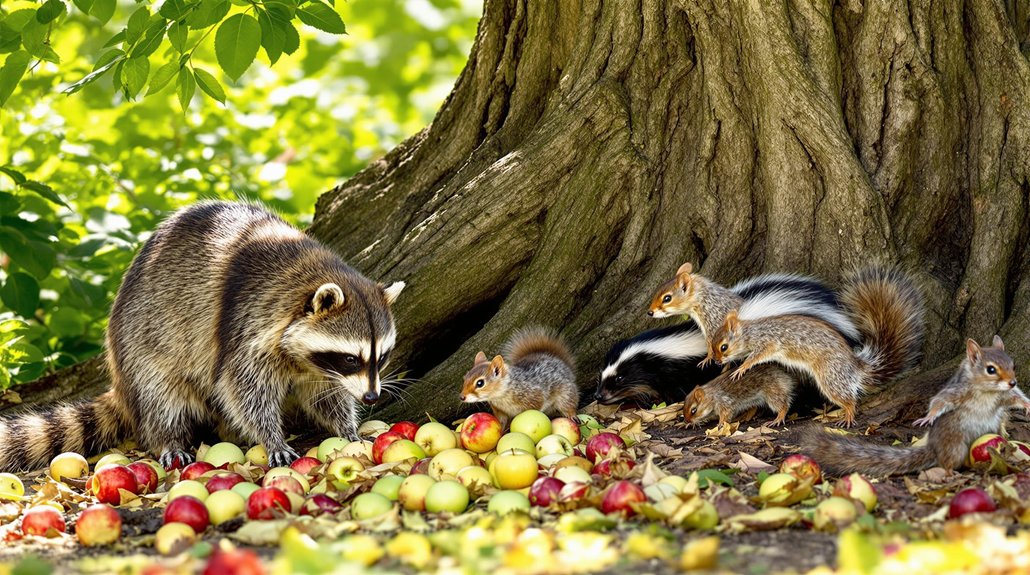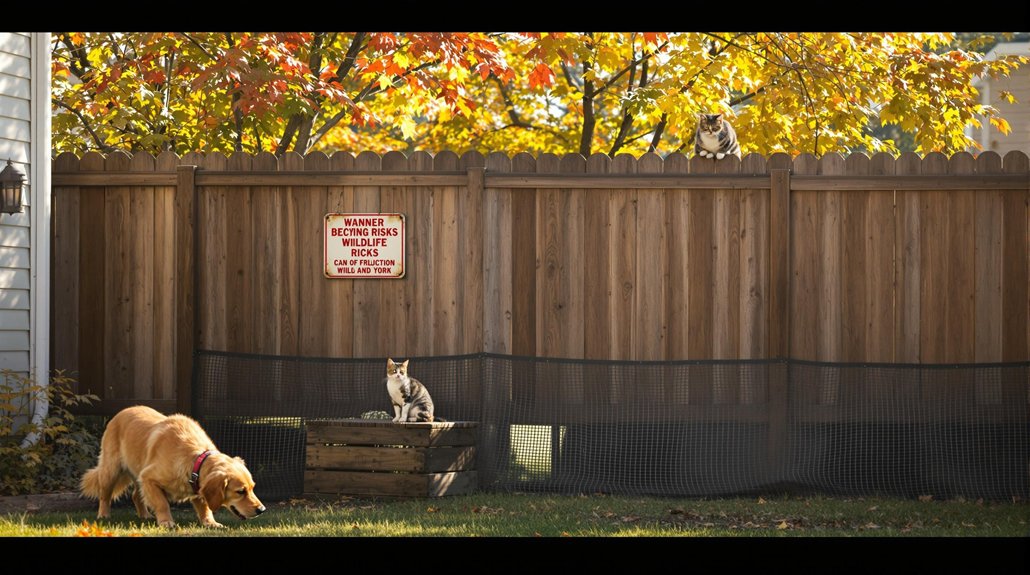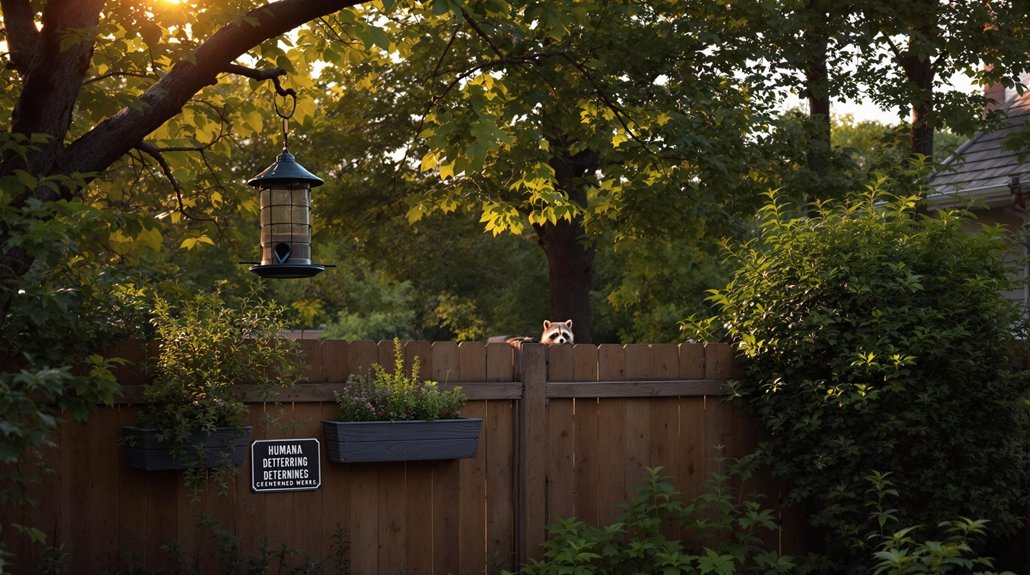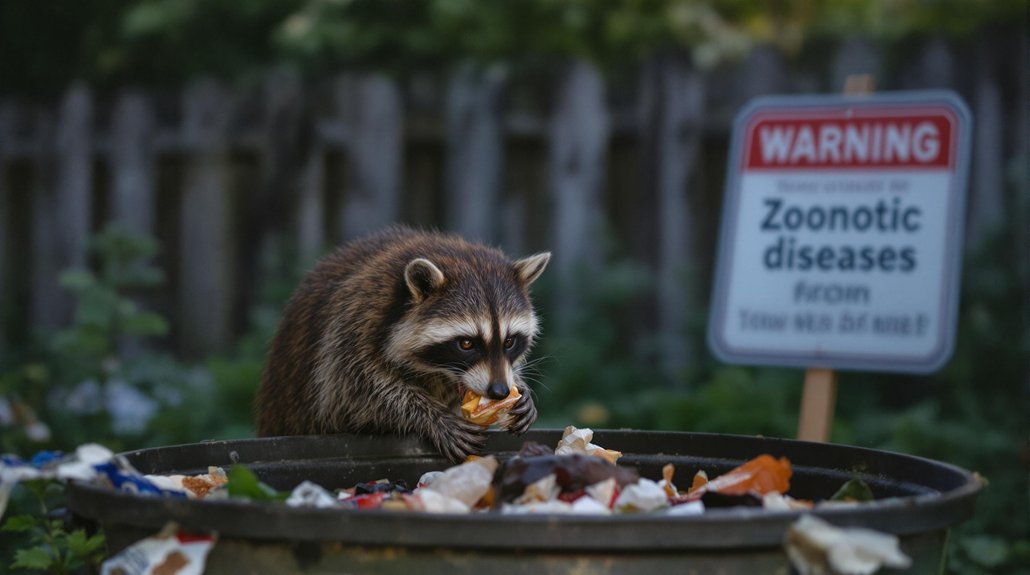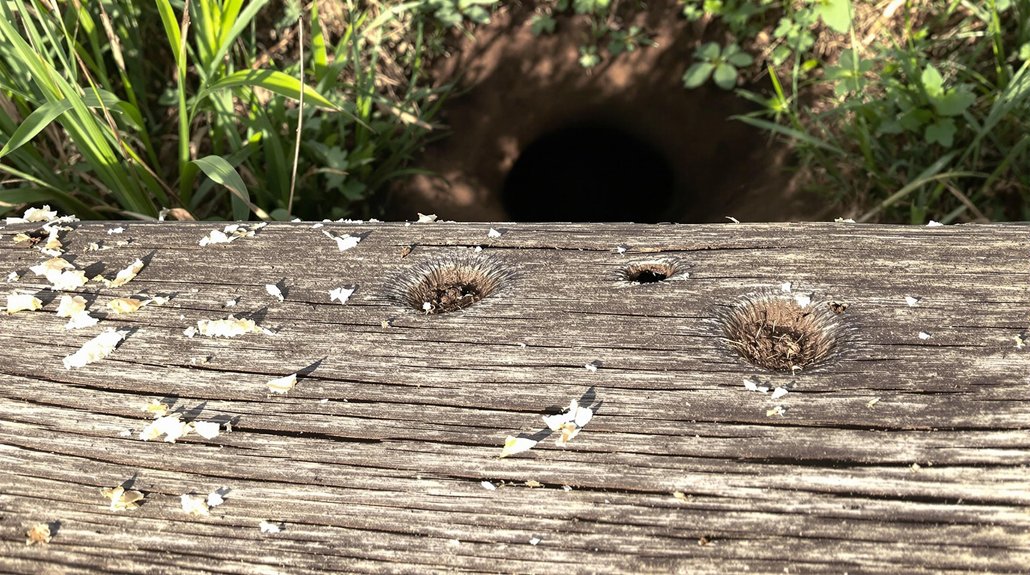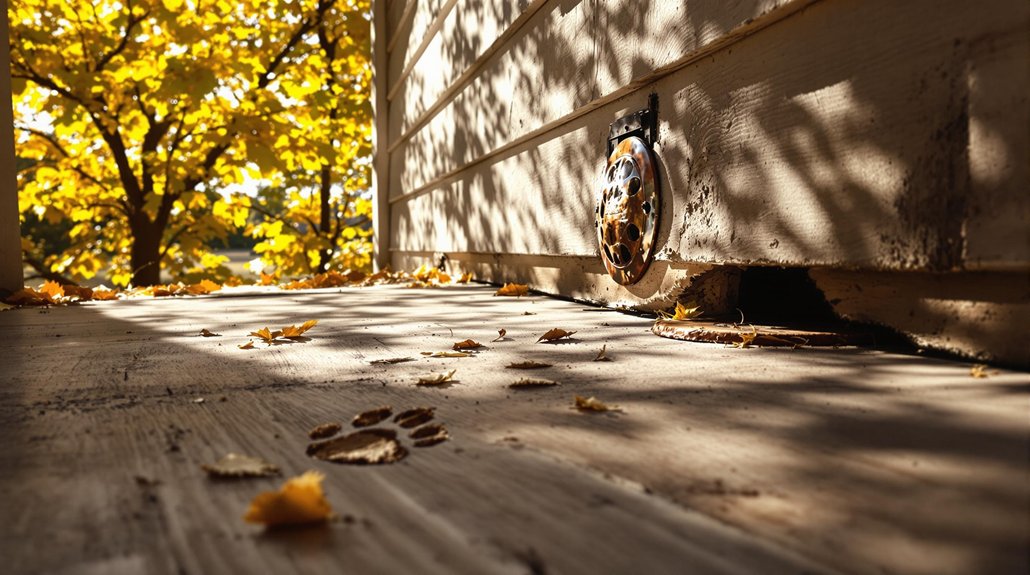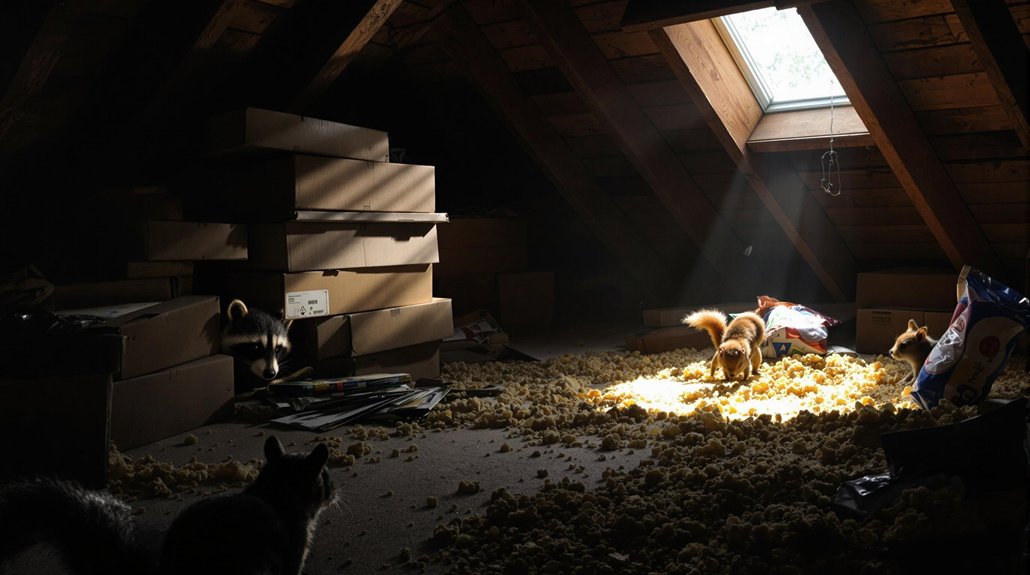Pet owners in Michigan should be aware of various wildlife-related diseases that can affect their pets. Lyme disease, transmitted by black-legged ticks, can lead to serious health issues if left untreated. Leptospirosis can occur from contact with contaminated water, while Giardia spreads through feces from wild animals. Rabies poses a severe threat from wild animal bites. Other concerns include tularemia, heartworm, and salmonella from wildlife. To protect pets, it's essential to keep them away from wild animals, guarantee vaccinations are current, and maintain good hygiene. Understanding these diseases is critical for pet health and safety, and more details are available.
Key Article Highlights
- Lyme disease, transmitted by black-legged ticks, can cause severe complications in pets if untreated; regular tick checks are essential for prevention.
- Leptospirosis is a bacterial infection from contaminated water or soil; vaccination and avoiding such areas can help protect pets.
- Giardia, a parasite from wildlife feces, poses infection risks; maintaining clean environments reduces exposure for pets in Michigan.
- Heartworm disease, spread by mosquitoes, requires monthly prevention medications and regular veterinary check-ups for early detection.
- Rabies, a serious viral disease, can be prevented through vaccinations, and awareness of wildlife interactions is crucial for pet safety.
Lyme Disease Overview
Lyme disease is a tick-borne illness caused by the bacterium Borrelia burgdorferi. This disease is mainly spread through the bite of infected black-legged ticks, commonly found in wooded and grassy areas. Understanding ticks' habitats is vital for prevention. These ticks thrive in environments with tall grass, shrubs, and leaf litter, making outdoor activities a risk for pets and humans alike.
Symptoms of Lyme disease can vary, but early signs often include fever, fatigue, and joint pain. In pets, you may notice similar symptoms, along with swelling in the joints. If untreated, the disease can lead to more severe health issues, including kidney problems and neurological disorders.
Prompt diagnosis and treatment options are essential for effective recovery. If Lyme disease is suspected, a veterinarian may conduct blood tests to confirm the presence of the bacteria. Treatment usually involves antibiotics, which can greatly improve health outcomes. It is vital for pet owners to be aware of the risks associated with ticks and to take preventive measures, such as using tick repellents and regularly checking pets for ticks after outdoor activities. Awareness and prompt action can help protect both pets and owners from Lyme disease.
Raccoon Roundworm Risks
Among the various wildlife-related diseases that can affect pets, raccoon roundworm poses a significant risk. This disease is caused by the Baylisascaris procyonis roundworm, which is commonly found in raccoons. Raccoon behavior plays a key role in the transmission of this parasite. Raccoons often defecate in areas such as gardens, parks, and playgrounds, contaminating the soil with their eggs. Pets can become infected when they ingest these eggs, either through contaminated soil or by eating rodents that have ingested the roundworm eggs.
To better understand the risks associated with raccoon roundworm, consider the following points:
- Raccoons are common in urban and rural areas of Michigan.
- The eggs are highly resilient and can survive in the environment for years.
- Symptoms in pets may include lethargy, loss of coordination, and seizures.
- Prevention includes keeping pets away from raccoon habitats and regular veterinary check-ups.
Pet owners must be vigilant about raccoon roundworm to protect their animals. Awareness and preventative measures can help reduce the risk of roundworm transmission and guarantee a healthier environment for both pets and their owners.
Leptospirosis in Pets
Leptospirosis in pets is a serious concern for pet owners in Michigan. This bacterial infection can affect dogs and cats and is often spread through contact with contaminated water or soil. Understanding the leptospirosis symptoms is vital for early detection and treatment. Common symptoms include fever, vomiting, diarrhea, and lethargy.
To help pet owners, the following table outlines key information about leptospirosis:
| Aspect | Details |
|---|---|
| Transmission | Contaminated water or soil |
| Common Symptoms | Fever, vomiting, diarrhea, lethargy |
| Diagnosis | Blood tests and urinalysis |
| Leptospirosis Treatment | Antibiotics and supportive care |
| Prevention | Vaccination and avoiding contaminated areas |
Prompt treatment is essential once leptospirosis symptoms are observed. Antibiotics are the primary treatment, along with supportive care for hydration and nutrition. Pet owners should consult a veterinarian if they suspect their pet may be affected. By staying informed and proactive, pet owners in Michigan can protect their furry companions from this serious disease.
Rabies Transmission
Rabies is a serious disease that can be transmitted by certain wild animals. Common carriers of rabies include bats, raccoons, and skunks. It is important for pet owners to understand how to prevent rabies and keep their pets safe.
Common Rabies Carriers
Understanding the common carriers of rabies is essential for pet owners, especially in areas like Michigan where wildlife interactions are frequent. Rabies is a viral disease that can affect various animals, and recognizing the most common carriers can help in managing risks.
The following animals are known to carry rabies:
- Bats: Particularly concerning due to large bat populations in Michigan, they are a primary source of rabies transmission.
- Raccoons: These animals are often found in urban and rural areas, presenting a risk to pets and humans alike.
- Skunks: Skunks are known to be common carriers of rabies and often interact with pets.
- Foxes: These canines can also harbor the virus and are frequently spotted in wooded or suburban areas.
Effective wildlife management strategies are vital in minimizing rabies risks. By understanding the behaviors and habitats of these common carriers, pet owners can take necessary precautions to protect their pets and families. Awareness and education are key components in preventing rabies transmission and ensuring a safer environment for all.
#
Prevention Strategies for Pets
Taking proactive steps to protect pets from rabies is essential for their health and safety. One of the most effective ways to prevent rabies is through pet vaccinations. Vaccinating pets on schedule helps build immunity against this deadly virus. Pet owners should consult their veterinarian to guarantee that their pets receive the rabies vaccine according to local regulations.
In addition to vaccinations, pet owners should be vigilant about wildlife encounters. Pets can be curious and may approach wild animals, increasing their risk of exposure to rabies. It is important to supervise pets when they are outside, especially in areas where wildlife is common. Keeping pets leashed during walks can help prevent them from interacting with potentially rabid animals.
Furthermore, pet owners should educate themselves about the signs of rabies in animals. If a wild animal appears sick or aggressive, it is best to keep a safe distance and contact local animal control. By combining pet vaccinations with careful management of wildlife encounters, pet owners can appreciably reduce the risk of rabies transmission and guarantee a safer environment for their beloved pets.
Giardia and Wild Animals
Giardia is a parasite that can be spread from wild animals to pets. It can cause symptoms like diarrhea and stomach upset in affected animals. Understanding how Giardia is transmitted and learning prevention strategies can help pet owners protect their furry friends.
Transmission From Wildlife
Wild animals can be a source of various diseases that may affect our pets, and Giardia is one of the most concerning. This parasite is commonly found in the feces of infected animals, including wildlife. When pets have wildlife interactions, they can be exposed to Giardia, leading to potential zoonotic diseases that can be transmitted to both pets and humans.
To help pet owners understand the risks, consider the following points:
- Sources of Infection: Wildlife like raccoons, deer, and beavers can carry Giardia.
- Environmental Contamination: Giardia cysts can survive in water and soil for long periods, increasing exposure risk.
- Pet Behavior: Pets that drink from puddles, streams, or lakes are at higher risk of infection.
- Preventive Measures: Regular veterinary check-ups and maintaining clean environments can reduce the risk of Giardia transmission.
Understanding how Giardia spreads from wildlife to pets is essential for preventing infection. By being aware of wildlife interactions and taking necessary precautions, pet owners can protect their animals from this harmful parasite and its associated zoonotic diseases.
Symptoms in Pets
Understanding the impact of Giardia on pets is essential for pet owners. This parasite, often found in wild animals, can lead to significant health issues in domestic pets. Recognizing the symptoms is critical for timely intervention and care.
Here are common symptoms to monitor in pets affected by Giardia:
| Symptom | Description | Importance |
|---|---|---|
| Diarrhea | Watery, foul-smelling stools | Indicates intestinal issues |
| Vomiting | Frequent or intermittent vomiting | May signal dehydration |
| Weight Loss | Unexplained loss of body weight | Affects overall health |
| Lethargy | Decreased energy or activity levels | Reflects general health |
| Abdominal Pain | Signs of discomfort or sensitivity | Could indicate infection |
Pet behavior can change as pets experience discomfort or pain. Health monitoring is crucial; observe any changes in appetite, energy, or litter box habits. Early detection of these symptoms can lead to effective treatment and recovery. If you notice any of these signs, consult your veterinarian for appropriate testing and care.
Prevention Strategies for Owners
Protecting pets from Giardia requires proactive measures by pet owners. Giardia is a parasite that can be found in wild animals, which can lead to infections in pets. To reduce the risk of infection, pet owners should take the following steps:
- Keep pets away from wildlife: Avoid areas where wild animals are known to frequent.
- Practice good hygiene: Regularly clean your pet's living area and wash their food and water bowls.
- Ensure pet vaccinations are up to date: Consult with your veterinarian to keep vaccinations current, as this can help bolster your pet's immunity.
- Monitor pet behavior: Watch for any unusual signs after outdoor activities, especially after wildlife encounters.
Tularemia Concerns
Tularemia, a bacterial disease caused by Francisella tularensis, poses a significant risk for both pets and their owners in Michigan. The primary route of tularemia transmission is through contact with infected animals, particularly rodents and rabbits. Pets can become infected by hunting or interacting with these animals, increasing the risk to their owners.
Symptoms of tularemia can vary. In pets, signs may include fever, lethargy, swollen lymph nodes, and skin ulcers. If a pet shows these symptoms, it is essential to seek veterinary care promptly. For humans, symptoms can include fever, chills, headaches, and fatigue. Severe cases might require hospitalization.
Preventing tularemia involves keeping pets away from wild animals and ensuring they are up to date on vaccinations. Pet owners should also practice good hygiene, such as washing hands after handling pets and avoiding contact with sick animals. Awareness of tularemia's risks can help protect both pets and their owners. By understanding tularemia transmission and symptoms, pet owners can take proactive steps to safeguard their health and the well-being of their pets in Michigan.
Heartworm Disease
Heartworm disease is another serious concern for pet owners in Michigan. This condition is caused by a parasite that lives in the hearts of infected dogs and cats. The disease is transmitted through mosquito bites, making it important for pet owners to take heartworm prevention seriously. Without proper treatment, heartworms can lead to severe health issues and even death.
Pet owners should be aware of the following heartworm symptoms:
- Coughing or wheezing
- Fatigue after mild exercise
- Weight loss or decreased appetite
- Swollen abdomen
Regular check-ups with a veterinarian are essential for early detection. A simple blood test can determine if a pet has heartworms. Timely diagnosis can lead to effective treatment options. Heartworm prevention is critical and includes medications that are given monthly. These medications help keep pets safe from infection.
Salmonella From Wildlife
Wildlife can pose various health risks to pets, and one significant concern is salmonella. This bacteria can be found in the feces of wild animals, such as birds, reptiles, and rodents. When pets interact with wildlife, they may come into contact with contaminated droppings or surfaces. This can lead to infections that may affect both pets and their owners.
Proper pet hygiene is essential to preventing salmonella infections. Regularly cleaning your pet's living area and ensuring they do not eat wild animals or their feces are important steps. Additionally, always wash your hands after handling your pet or cleaning their spaces.
| Type of Wildlife | Potential Risk | Symptoms in Pets |
|---|---|---|
| Birds | Salmonella | Diarrhea, vomiting |
| Reptiles | Salmonella | Fever, lethargy |
| Rodents | Salmonella | Abdominal pain, fever |
Understanding the risks associated with wildlife interaction helps pet owners take necessary precautions. By being aware of the dangers and maintaining good pet hygiene, you can protect your furry friends from salmonella and other wildlife-related diseases.
## Prevention Strategies for Pets
To protect pets from wildlife-related diseases, implementing effective prevention strategies is essential. Pet owners in Michigan should take proactive steps to guarantee the health and safety of their pets. One of the best ways to prevent diseases is through regular pet vaccinations. Keeping vaccines up to date protects pets from various illnesses that can be transmitted by wildlife.
Additionally, increasing wildlife awareness can help pet owners identify potential risks. Understanding local wildlife and their behaviors can reduce encounters that may lead to disease transmission. Here are some key strategies to evaluate:
- Regular Vet Visits: Schedule routine check-ups for vaccinations and health assessments.
- Limit Outdoor Exposure: Supervise pets when outside, especially in areas with known wildlife activity.
- Feeding Practices: Do not leave pet food outdoors, as it can attract wildlife.
- Secure Trash: Use animal-proof containers to prevent wildlife from scavenging.
Frequently Asked Questions
What Are the Symptoms of Wildlife-Related Diseases in Pets?
Symptom recognition in pets is essential for early intervention. Common signs include lethargy, loss of appetite, vomiting, and unusual behavior. Disease prevention through vaccination and regular veterinary check-ups can greatly reduce the risk of wildlife-related illnesses.
How Can I Test My Pet for These Diseases?
To test your pet for wildlife-related diseases, consult your veterinarian for appropriate testing methods. They can recommend blood tests, fecal examinations, or other diagnostic procedures based on symptoms and potential exposure to wildlife.
Are Certain Breeds More Susceptible to Wildlife Diseases?
Like a delicate flower, each dog breed has its own strengths and weaknesses. Breed vulnerability to wildlife diseases can stem from genetic predisposition, making some breeds more susceptible than others to certain infections and health risks.
Can My Pet Transmit These Diseases to Humans?
Yes, pets can transmit zoonotic diseases to humans, posing transmission risks. It is essential to maintain good hygiene practices, regular veterinary check-ups, and vaccinations to protect both pets and humans from potential health threats.
How Often Should I Vaccinate My Pet Against These Diseases?
Imagine a fortress protecting your pet from invisible threats! Adhering to a strict vaccination schedule is essential; typically, initial vaccinations are followed by booster shots annually. Consult your veterinarian for tailored recommendations based on specific risks.
